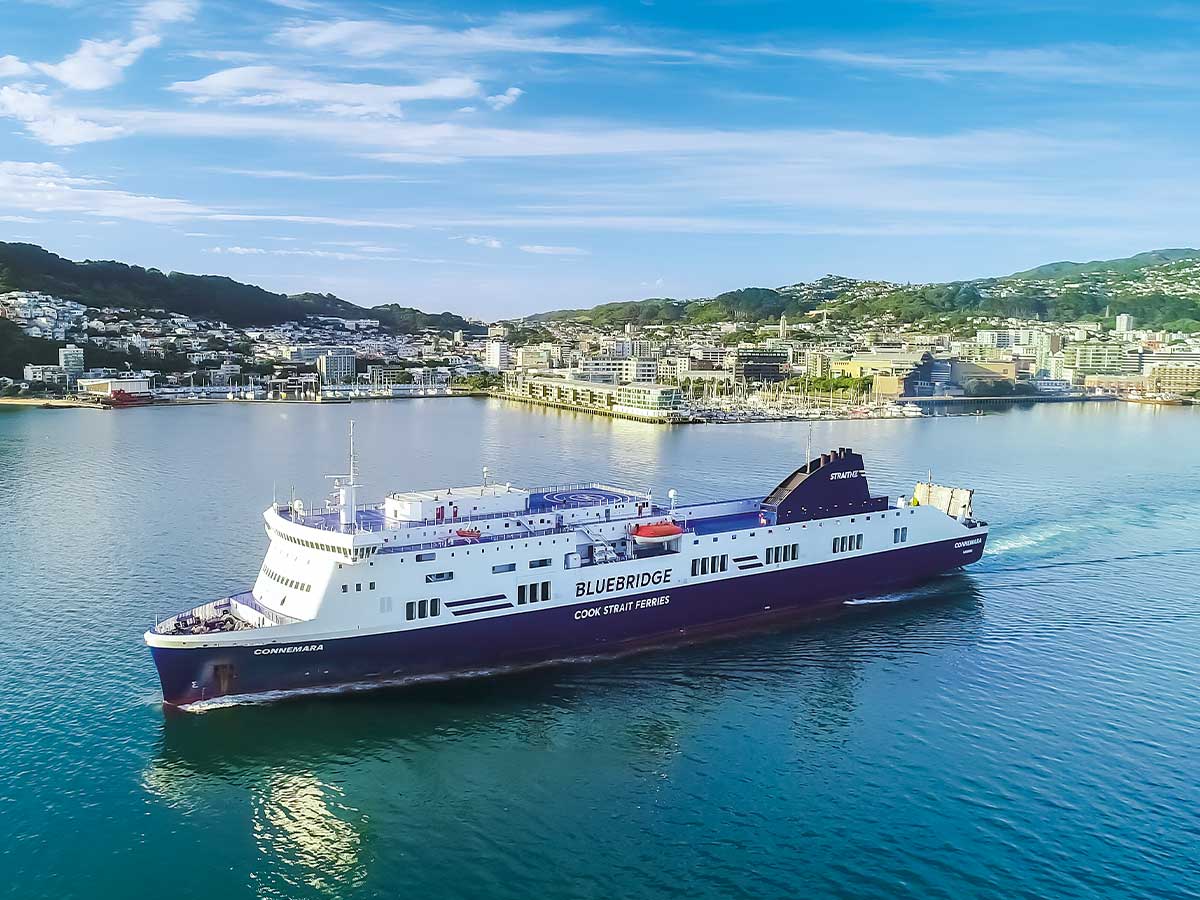Both of New Zealand’s main islands offer many amazing places to explore in an RV. As such, most travellers sooner or later find themselves getting ready to cross the Cook Strait. Lisa Jansen offers some useful advice for those planning inter-island travel.
Travelling across Cook Strait with a motorhome or caravan for the first time can be daunting. With two different operators and five ferries to choose from, even seasoned travellers might wonder which is best and how to ensure the crossing goes smoothly. To help, this issue of Getting into Gear summarises everything you need to know about crossing the Cook Strait with
your RV.
The operators and ferries
There are two operators: Bluebridge Cook Strait Ferries and Interislander. Both offer daily sailings, often around the same time and at similar prices. However, there are differences in the ferries. Which one is best for you will come down to individual requirements.
Booking and getting ready for your crossing
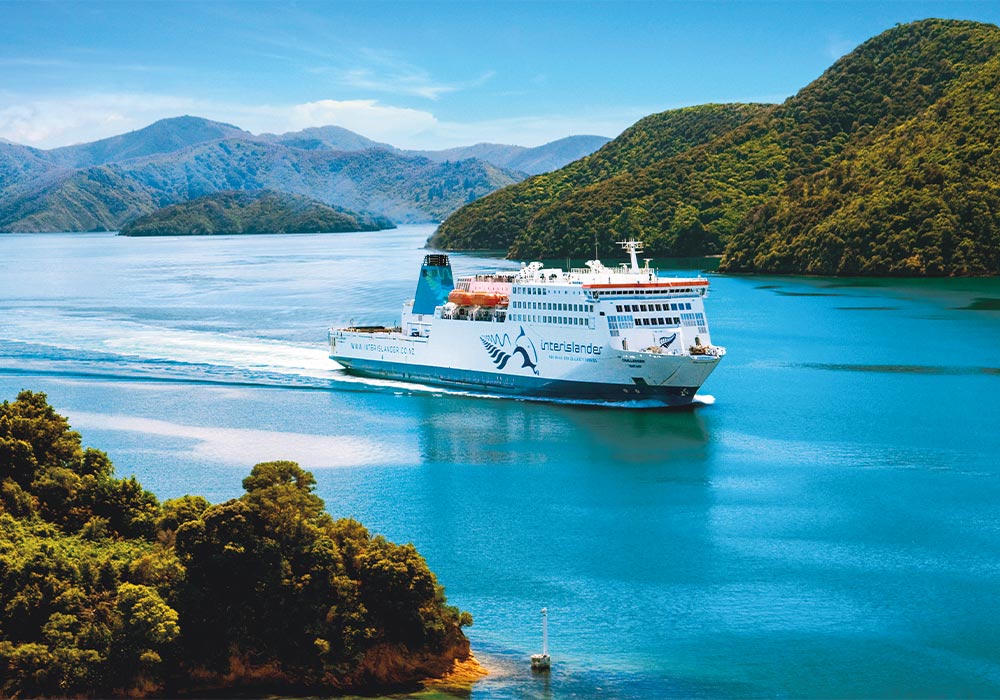
The ferries often book out in summer and during school holidays, so if that’s your chosen time for travel, make sure you book early. Also, ensure you provide the correct vehicle type and length, otherwise, you risk your ticket not being valid.
Interislander and Bluebridge both have partnerships that offer members discounts on ferry sailings. The most relevant for RVers are the NZMCA, All Points Campaign, and the Top 10 Club. Check with the relevant clubs for details to get the best price. If you’re a musician, you might even be able to travel for free with Interislander as part of the Bands on Board promotion.
On the day of your sailing, arrive at the terminal by the time stated on your ticket. Turn off your gas bottles and have everything you might need during the sailing ready to take with you, as you won’t be able to get to your vehicle during the sailing, regardless of which ferry you’re on.
Boarding the ferry
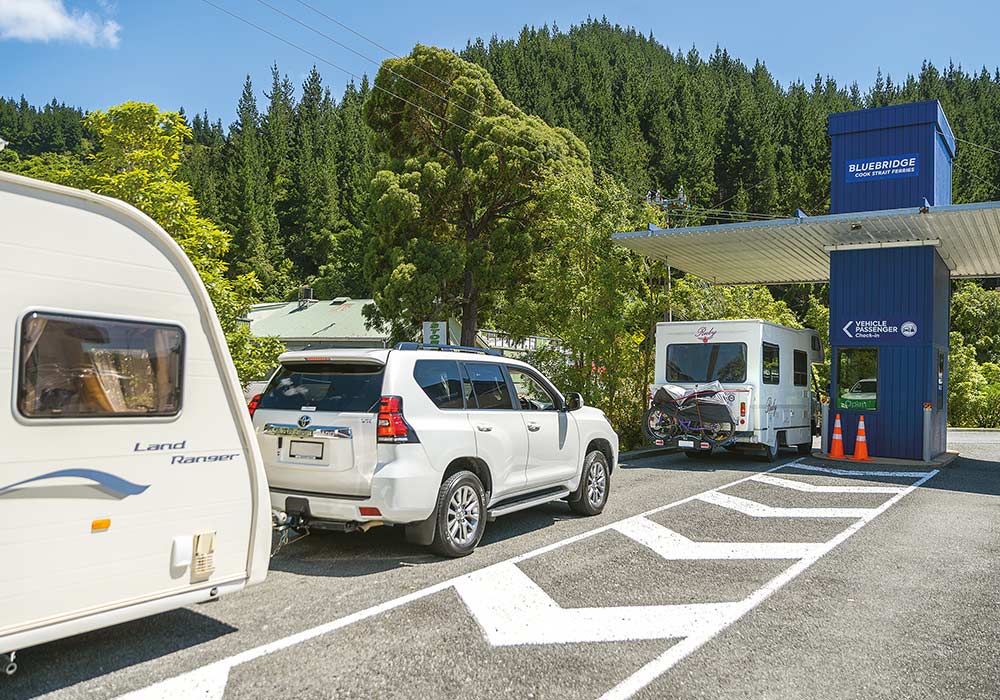
Boarding the ferry in an RV can be daunting, especially for first-timers, but there’s no reason to worry, as Duncan Roy, GM of operations at Interislander, explains.
“There are a few key steps to follow that will help make your boarding seamless. Make sure you’ve checked in at least one hour prior to the scheduled departure time, have your ticket or reservation number ready for the check-in staff, and follow the marshal’s instructions to your boarding lane. From there, our marshals will look after you.”
Interislander’s Kaitaki and Kaiarahi allow vehicles to drive on from one end and off on the other, meaning you don’t have to turn around. The other ships require turning, but there’s plenty of space and a friendly crew to help. Rachael Setter, marketing manager at Bluebridge, advises nervous travellers to take it slow.
“We board those travelling in vehicles well in advance of the ship departing, so there’s no time-related stress. If you’re nervous about driving onto the ferry, let our crew know, and they will help.”
Once parked, put your vehicle in gear, apply your handbrake, turn off all alarms, and lock it. Finally, remember to take everything you might need with you, and then follow the crew members’ instructions to the passenger decks.
On board
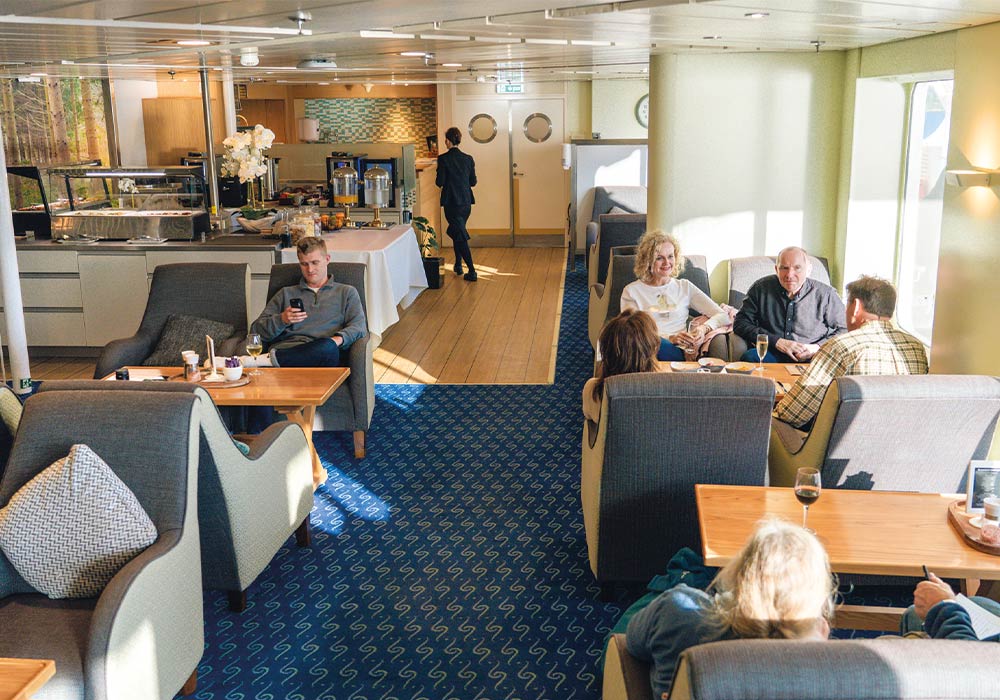
All five Cook Strait ferries offer several comfortable seating areas, cafés, bars, and entertainment options. And, of course, all of them also have viewing decks from which you can take in the beautiful surroundings, particularly in the Marlborough Sounds.
All ferries offer free WiFi. However, it’s often not the fastest or most reliable. Therefore, it’s recommended to download content you want to watch or listen to before your journey.
Both Bluebridge ferries, as well as Interislander’s Kaitaki, also offer private cabins should you desire some extra privacy, and all Interislander ships have premium lounges for those who like a bit of luxury. In addition, Interislander allows you to book specific seats in the Queen Charlotte and Pelorus Jack Lounges.
Where to stay before and after your crossing Those with an early or late sailing are often keen to stay close to the ferry terminal the night before or after the crossing. Unfortunately, neither operator can accommodate RVers parking overnight at the terminal. However, several options on either end can be found on the CamperMate and NZMCA mobile apps.
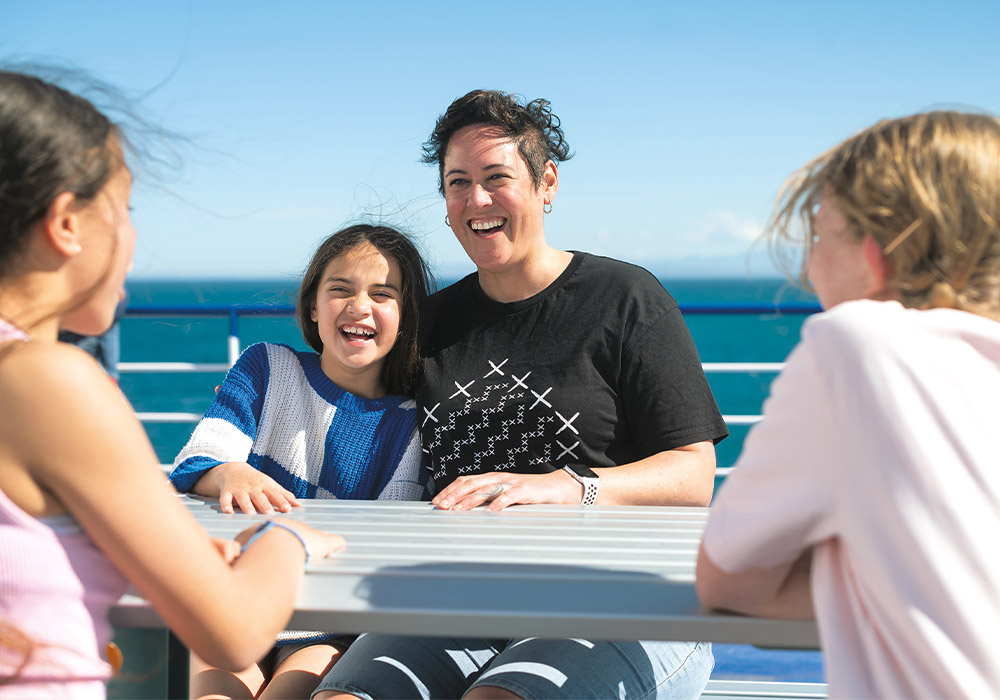
Wellington
- Barnett Street Car Park (self-contained only)
- Evans Bay Marina (free, certified self-contained only)
- Plimmerton NZMCA park
- Wellington TOP 10 Holiday Park in Petone
- Capital Lodge Motor Inn
- Several freedom camping spots around Plimmerton (check the apps)
Picton
- Several holiday parks in Picton and Waikawa
- Whatamango Bay Camping area,
- DOC site
- The NZMCA PoP at the Crow Tavern
- The NZMCA PoP in Koromiko
- Wairau Diversion Park (free)
Travelling with pets
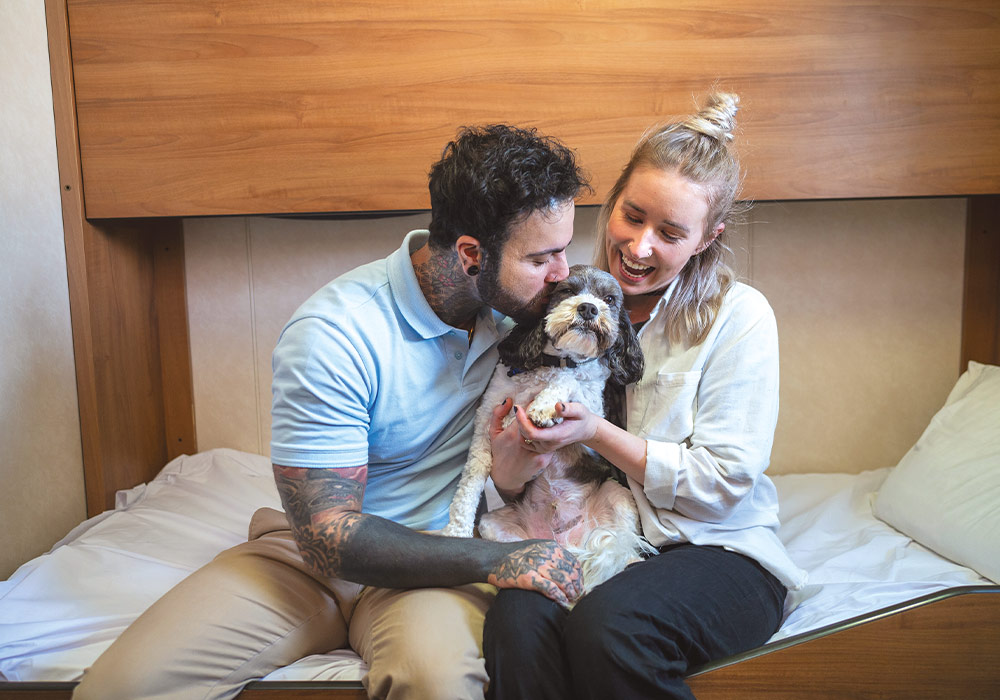
The ferry crossing can be extra stressful if you’re travelling with pets. However, both operators are well set up for furry passengers. On all five ships, your pets can stay in the RV or car at no extra charge or travel in a kennel for a small fee.
If you’re leaving your pet in the car or RV, it’s important to tell staff, says Duncan Roy from Interislander.
“You will be given a special hanger to attach to your rearview mirror. During the journey, our crew will look for your hanger and monitor your pet’s well-being. If the crew finds your pet is uncomfortable or stressed, an announcement will be made.”
Rachael Setter from Bluebridge has good news for travellers who hate leaving their dog behind.
“Up to two dogs can travel onboard Connemara with you in one of our dedicated dog-friendly cabins, which can be pre-booked for an additional fee. In addition, a communal outside dog exercise area is also available onboard for passengers who’ve booked a dog-friendly cabin.”
These dog-friendly cabins are in hot demand and only available on selected sailings, so book early. Further specific guidelines and rules exist for travelling with pets on all ships. Please take the time to familiarise yourself with them. Information can be found on the operators’ websites.
Interislander: interislander.co.nz/explore/travelling-with-your-pet-on-the-interislander
Bluebridge: bluebridge.co.nz/check-in/#pets
In summary, with proper preparation and planning, crossing the Cook Strait on a ferry will be an enjoyable experience instead of stressful, and beautiful destinations await on either end.
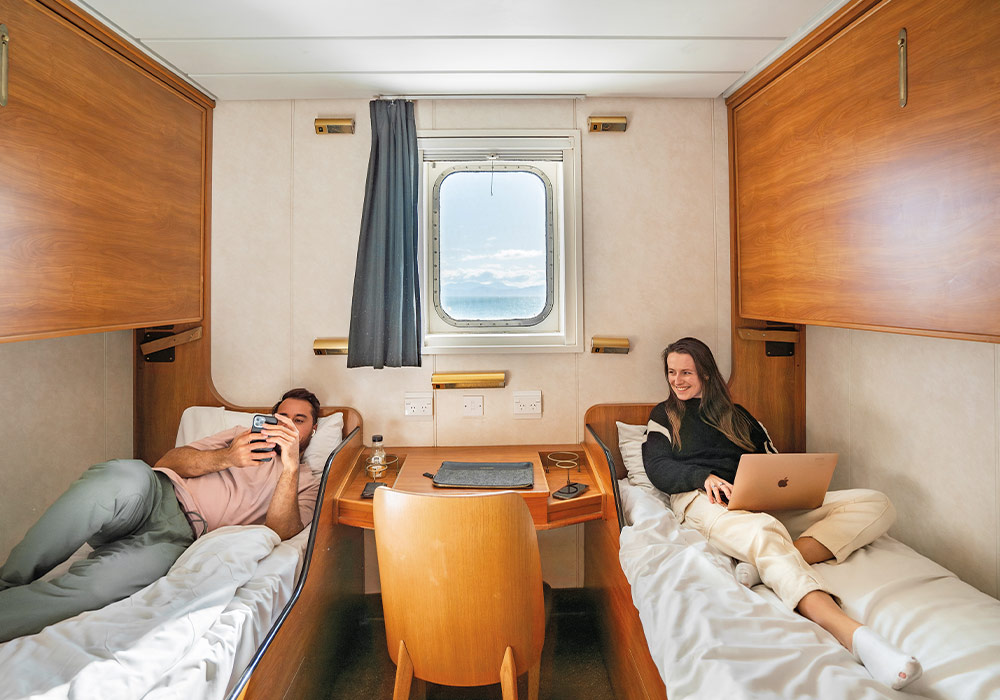
| Connemara (Bluebridge) | Strait Feronia (Bluebridge) | Kaitaki (Interislander) | Kaiarahi (Interislander) | Aratere (Interislander) | |
|---|---|---|---|---|---|
| No-turn drive-on drive-off | No | No | Yes | Yes | No |
| Lifts to car deck | No (escalators from Deck 3) | Yes | Yes | Limited | Yes |
| Private cabins | Yes | Yes | Yes | No | No |
| Café/bars | 2 | 2 | 3 | 2 | 2 |
| Cinema | No | Yes (free) | Yes (paid) | No | Yes (paid) |
| Kids play area | Yes | Yes | Yes | Yes | No |
| Premium adults-only lounge | No | No | Yes | Yes | Yes |
| Kennels for pets | Yes | Yes | Yes | Yes | Yes |
| Pets allowed in vehicle | Yes | Yes | Yes | Yes | Yes |
| Dog-friendly cabins | Yes | No | No | No | No |

